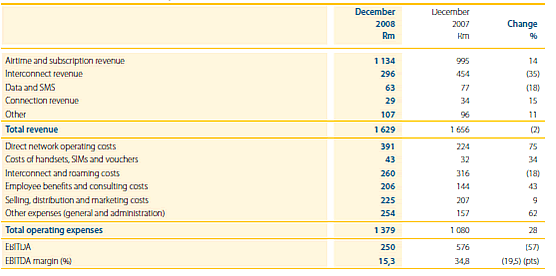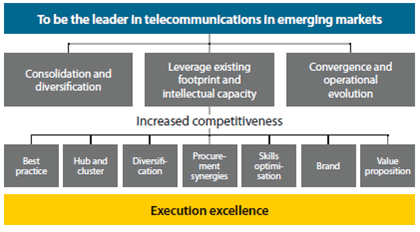 MTN Sudan
MTN Sudan
All data are collected in the Fiscal Year of 2008-2009.
Company Profile and History
Launched in 1994, the MTN Group Limited (MTN Group) is a multinational telecommunications group, with its core operations in 21 countries in Africa and the Middle East. As at the end of December 2008 MTN recorded more than 90 700 000 subscribers.
MTN launched in Sudan in September 2005. The Company, through its legal entity Bashair Telecom, won the second GSM license in Sudan in September 2004. MTN Sudan’s distributors have more than 8 500 points of sale in the country and a subscriber base of 3 million.
In Country Location
70, block No. 19, Abdallah el tayeb, Khartoum, Sudan; 2: Borj Al barak, 10th floor, down town, Khartoum, Sudan
Services and Products
The MTN Group is a leading provider of telecommunications services, offering cellular network access and business solutions. To boost acquisitions and utilisation during 2008, MTN Sudan launched a series of marketing activities, including focusing on cities outside the capital with low commercial coverage where it launched the Y’ello Storm campaign of special offers. Towards year-end it introduced “the 50% extra credit” campaign as well as a promotion to encourage international calls by giving away four free international minutes for every four international minutes used.
Number of Employees
800 employees in Sudan
Financial Information
MTN Sudan revenue and expenses summary

Market Share
MTN Sudan has a market share of 28 percent
Business Objective
"To be the leading provider of telecommunications in emerging markets"
Business Model

MTN's strategy is built on three pillars-consolidation and diversification; leveraging its footprint and intellectual capacity; and convergence and operational evolution. MTN estimate that the addressable mobile telephony market in its present footprint will grow to over 381 million in the next five years from 220 million now. MTN remains highly competitive in all its markets, putting it in good stead to take advantage of significant future growth opportunities.
Consolidation and diversification: In the last financial year, MTN continued to evaluate various opportunities to continue to grow its business and diversify earnings through leveraging its scale and offerings. Its comparatively low level of gearing enables it to consider potential acquisitions with confidence regarding its ability to finance such acquisition.
Leveraging its footprint and intellectual capacity: MTN has built a strong global brand and is recognised for its leadership in mobile telephony in emerging markets. Its brand is a key differentiator, and its strategy is to leverage it to achieve even greater growth and efficiencies.
Convergence and operational evolution: There is a growing acceptance of the inevitable importance of data within the industry, with significant implications for infrastructure. MTN accelerated its preparations for an era, in which mobile operators will become meaningful providers of internet-based connectivity. It has started work on the transition of the network infrastructure across all 21 markets to the next-generation, packet-switch network, based on Internet Protocol (IP). The installation of new-generation radio equipment makes use of network technologies such as EDGE and 3G, allowing for increased data access and improved voice quality.
MTN Swaziland’s strategic priorities include the following: completing the final elements to integrate acquisitions that complement its expansion strategy; optimising regional synergies and ensuring strategic regional focus through a hub and cluster structure; continuing to pursue appropriate expansion opportunities to further diversify earnings and consolidate its position; improving operational efficiency through its least-cost operator strategy and exploring outsourcing to improve the business model; and taking advantage of money transfer and mobile money opportunities in MTN Group Markets.
Ownership of Business
The Group has a shareholding of 85 percent in MTN Sudan
Benefits Offered and Relations with Government
Sudan’s national information and telecommuni¬cations strategy is integral to its national comprehensive development strategy. The country has developed laws that govern all aspects of the telecommunications sector. The sector is regulated by the National Telecom¬munications Company (NTC) established by the national telecommunications bill in 1996.
The telecommunications sector is almost completely liberalised with government ownership limited to 20 per cent of Sudatel, the second largest operator. There is no national telecommunications universal coverage and affordability policy. However, NTC, in collaboration with operators, has established a “National Telecommunications Support Fund” that provides support to individuals to build and operate commercial universal telecommunications service centres; assist schools and universities in acquiring computers and Internet connectivity; and help poor families to acquire computers.
There is a unified service neutral licensing regime for fixed-line and mobile services. There are no subsidies or price caps imposed by the regulator. The law prohibits common ownership between the fixed line and mobile phone operators. Various frequency bands are used by the operators, including WiFi 2.8 and CDMA 45-55. Roaming services are available through Zain and MTN but restricted to a few African and Gulf states. Telecommunications services and equipments such as mobile phones are subject to a flat VAT rate of 15 per cent, but computers can be imported duty free. Regulatory risks stem mainly from a lack of transparency and accountability in enforcement and appear to have no significant impact on operators’s investment decisions.
It was a difficult year for MTN Sudan in 2008, mainly as a result of the regulator’s directive to disconnect more than 1, 1 million prepaid subscribers who had not registered their personal details.
Product Development
The roll out of new infrastructure continued during 2008, particularly in southern Sudan. 424 base transceiver stations were added to the network, bringing the total to 1 621. MTN Sudan’s network now covers 45, 3% of the population, up from 42, 8% at the end of 2007. In November, MTN Sudan put a new intelligent network platform into service, and also worked on implementing a swap of vendor for the core network. This enables the operation to offer the best technologies to its customers (like MTN Zone) as well as allowing it to benefit from working on the same platform as other MTN operations.




